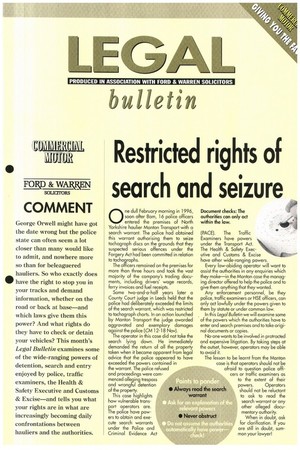LAletin
Page 37

If you've noticed an error in this article please click here to report it so we can fix it.
Restricted rights of search and seizure
ne dull February morning in 1996, soon after 8am, 16 police officers entered the premises of North Yorkshire haulier Manton Transport with a search warrant. The police had obtained this warrant authorising them to seize tachograph discs on the grounds that they suspected serious offences under the Forgery Act had been committed in relation to tachographs. The officers remained on the premises For more than three hours and took the vast majority of the company's trading documents, including drivers' wage records, ferry invoices and fuel receipts.
Some two-and-a-half years later a County Court judge in Leeds held that the police had deliberately exceeded the limits of the search warrant, which was restricted to tachograph charts. In an action launched by Manton Transport the judge awarded aggravated and exemplary damages against the police (CM 1 2-1 8 Nov).
The operator in this case did not take the search lying down. He immediately demanded the return of all the property taken when it became apparent from legal advice that the police appeared to have exceeded the powers contained in the warrant. The police refused and proceedings were com menced alleging trespass and wrongful detention of the property. This case highlights how vulnerable trans port operators are. The police have powers to obtain and execute search warrants under the Police and Criminal Evidence Act (PACE). The Traffic Examiners have powers under the Transport Act. The Health & Safety Executive and Customs & Excise have other wide-ranging powers. Every law-abiding operator will want to assist the authorities in any enquiries which they make—in the Manton case the managing director offered to help the police and to give them anything that they wanted. Any enforcement personnel, be they police, traffic examiners or FISE officers, can only act lawfully under the powers given to them by statute or under common law. In this Legal Bulletin we will examine some of the powers which the authorities have to enter and search premises and to take original documents or copies.
No-one wants to be involved in protracted and expensive litigation. By taking steps at the outset, however, operators may be able to avoid it.
The lesson to be learnt from the Manton case is that operators should not be afraid to question police officers or traffic examiners as to the extent of their powers. Operators should not be reluctant to ask to read the search warrant or any other alleged documentary authority. When in doubt, ask for clarification. If you are still in doubt, summon your lawyer!






















































































































